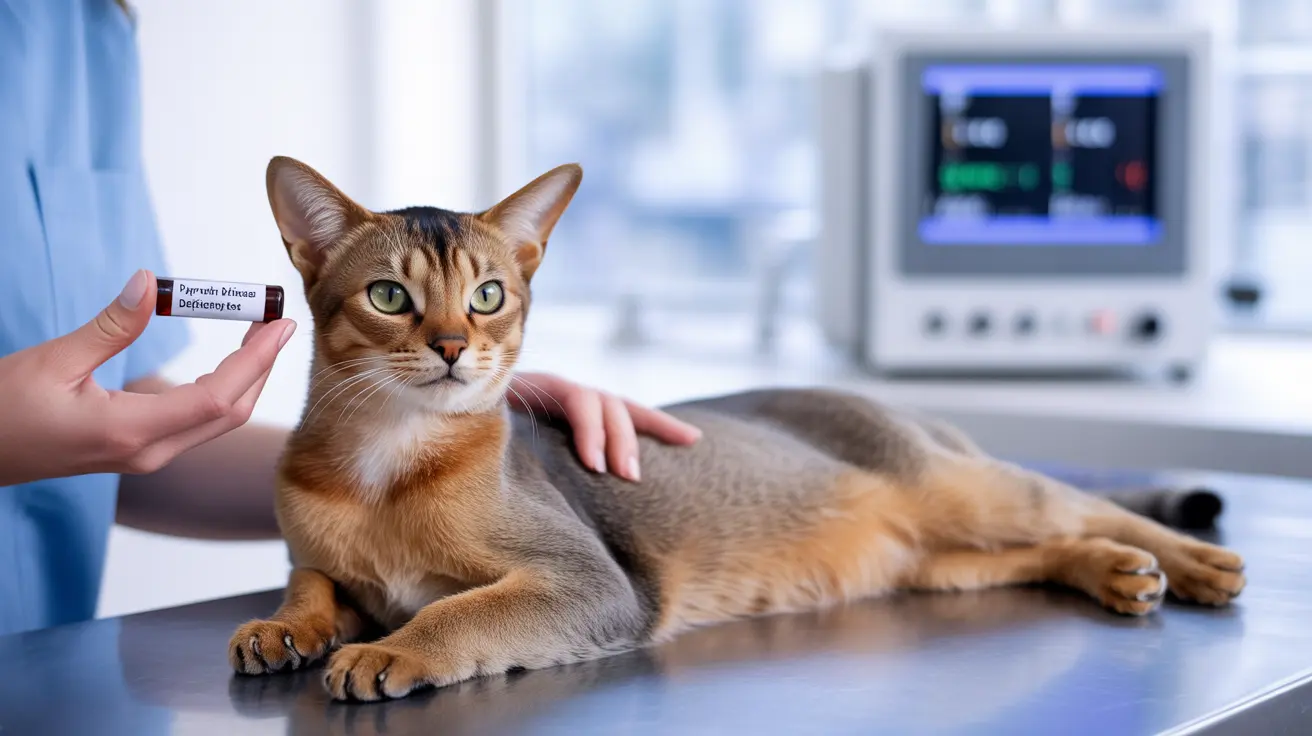ピルビン酸キナーゼ欠損症とは?
ピルビン酸キナーゼ欠損症(PKD)は、猫の中でも特に特定の純血種で多く見られる、重大な遺伝性代謝疾患です。この遺伝病は猫の赤血球がエネルギーをうまく産生できなくなり、そのため赤血球が早期に壊れることで慢性的な貧血を引き起こします。猫が両親からPKLR遺伝子の異常なコピーを受け継いだ場合に発症します。
この疾患はどの猫種でも発症する可能性がありますが、特にアビシニアンやソマリなどで多く見られ、一部の血統では約30%が異常遺伝子を保有しているとも言われています。猫 ピルビン酸キナーゼ欠損症 原因や、症状・管理方法を知ることは、飼い主やブリーダーにとって大変重要です。これは、猫 遺伝性貧血 症状の1つとして注目されています。
遺伝的背景と遺伝様式
この病気はPKLR遺伝子の変異に起因しています。PKLR遺伝子はピルビン酸キナーゼという酵素を作り出し、赤血球がエネルギーを生成する“解糖系”というプロセスで重要な役割を担っています。酵素が不足すると赤血球は正常な寿命を維持できず、結果として早期破壊されてしまいます。
ピルビン酸キナーゼ欠損症 猫 遺伝は「常染色体劣性遺伝」形式です。つまり、両親がともに疾患遺伝子を保有している場合に、子猫が発症します。キャリア(保因猫)は無症状であり、猫 ピルビン酸キナーゼ欠損症 キャリアとは、猫のブリーディングにおいて猫 ピルビン酸キナーゼ欠損症 遺伝子検査が不可欠となっています。特に「アビシニアン ピルビン酸キナーゼ欠損症」や「ソマリ ピルビン酸キナーゼ欠損症 遺伝子検査」は高リスクとされます。
症状と初期サインを見分けるポイント
猫 ピルビン酸キナーゼ欠損症 症状や進行具合は猫によってさまざまですが、多くは若齢〜若年成猫で現れます。よく見られる症状は以下の通りです:
- 元気消失や虚弱(猫 ピルビン酸キナーゼ欠損症 しんどそう)
- 歯茎や粘膜が白っぽい(猫 貧血 サイン 見分け方)
- 成長不良や原因不明の体重減少
- 食欲低下・被毛の質の悪化(猫 ピルビン酸キナーゼ欠損症 食事 管理にも注意)
- 脾臓肥大(脾腫)
- 黄疸が出ることもある
- 心拍数や呼吸数の増加
- 異常な物を食べてしまう(異嗜行動)
猫 貧血 症状 初期や猫 赤血球 病気 症状にも注意し、早期発見が長生きのカギとなります。
診断と検査方法
獣医師は複数の方法で猫 ピルビン酸キナーゼ欠損症 診断方法を行います。診断では以下の検査が用いられます:
- 血液検査(CBC)による貧血評価(猫 ピルビン酸キナーゼ欠損症 血液検査)
- 血液生化学検査
- PKLR遺伝子変異の有無をみる遺伝子検査(ピルビン酸キナーゼ欠損症 猫 遺伝子検査 費用も事前確認を)
- 脾臓や肝臓などの超音波検査
- 尿検査でビリルビンの上昇を確認
猫 遺伝性疾患 検査 方法として、遺伝子検査は確定診断とブリーディング管理の両面で重要です。
治療と長期管理
猫 ピルビン酸キナーゼ欠損症 治療法として根本的な完治法はありませんが、工夫次第で良好な生活を送ることができます。主な管理方法は以下の通りです:
- 定期的な獣医の診察(モニタリング)
- 高品質な栄養管理と必要なサプリメント利用(猫 ピルビン酸キナーゼ欠損症 食事 管理)
- ストレスの軽減
- 必要に応じて輸血
- 二次的な合併症への治療
- 重症例では骨髄移植も検討されるが、コストやリスクから稀
猫 ピルビン酸キナーゼ欠損症 生活管理、およびピルビン酸キナーゼ欠損症 猫 長生きする方法の工夫次第で、症状をコントロールしながら快適な暮らしを目指せます。
ブリーディングによる予防
猫 ピルビン酸キナーゼ欠損症 予防のためには、責任ある繁殖管理が重要です。具体的には下記の点が勧められます:
- ハイリスク猫種は全頭猫 ピルビン酸キナーゼ欠損症 遺伝子検査を徹底
- キャリア同士は絶対に交配しない
- 発症猫は繁殖に用いない
- 詳細なブリーディング記録の保管
- 定期的な健康スクリーニングの実施
特に猫 貧血 原因 遺伝性や猫 ピルビン酸キナーゼ欠損症 血液疾患が疑われる血統には、しっかりと注意しましょう。
よくある質問
猫のピルビン酸キナーゼ欠損症とは何ですか?
ピルビン酸キナーゼ欠損症は、猫の赤血球がエネルギーを作れなくなり、早期に壊れることで慢性貧血を引き起こす、遺伝性の血液疾患です。特にアビシニアンやソマリなど一部の猫種で多く見られます。
ピルビン酸キナーゼ欠損症の症状はどんなものがありますか?
主な症状は、元気消失、虚弱、歯茎や粘膜の蒼白、成長不良、食欲低下、黄疸(場合による)、心拍数や呼吸数の上昇、そして異嗜行動などです。
どのようにしてピルビン酸キナーゼ欠損症は診断されますか?
診断は、血液検査(CBC・生化学検査)、PKLR遺伝子変異の遺伝子検査、超音波検査、尿検査などを組み合わせて行います。
猫がこの病気のキャリアであることはどうやってわかりますか?
無症状であっても、PKLR遺伝子の遺伝子検査を行うことでキャリアかどうかを判別できます。
治療法はありますか?完治しますか?
根本的な完治法はありませんが、定期的な獣医ケア、適切な栄養管理、ストレス軽減、必要に応じた輸血などで症状のコントロールは可能です。骨髄移植が選択されることもありますが、非常に稀です。
どの猫種がピルビン酸キナーゼ欠損症にかかりやすいですか?
特にアビシニアン、ソマリで多く報告されており、その他でもベンガルやエジプシャンマウなどで発症例があります。
この病気の猫の生活管理で重要なことは何ですか?
定期的な獣医チェックや適切な食事、ストレスの少ない安定した環境づくり、合併症への対応などが重要です。
遺伝子検査はどのように受けられますか?
動物病院や専門の検査機関でPKLR遺伝子の検査を受けることができます。費用や詳細は事前に獣医と相談しましょう。
ピルビン酸キナーゼ欠損症の猫の寿命はどれくらいですか?
しっかりとした管理と早期発見・対応次第で、快適に長生きできる可能性があります。
繁殖の際にどうすればこの病気を防げますか?
高リスク猫種では遺伝子検査を徹底し、キャリア同士や発症猫を交配させないこと、定期的な健康管理と記録管理が予防の鍵です。
ピルビン酸キナーゼ欠損症の症状が軽い場合でも注意すべき点はありますか?
軽度であっても定期的な健康チェックと早期対応、生活環境の整備が必要です。細かな体調変化を見逃さないようにしましょう。
まとめ
ピルビン酸キナーゼ欠損症は、注意深い管理と定期的なケアが欠かせない遺伝性疾患です。完治はできませんが、病気の理解や症状の早期発見、適切なケアにより、猫たちは快適な生活を送ることができます。ブリーダーの方は遺伝子検査や責任ある繁殖管理を徹底し、次世代の発症リスク低減に取り組みましょう。






